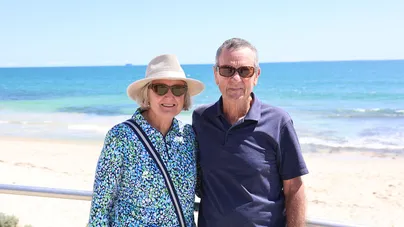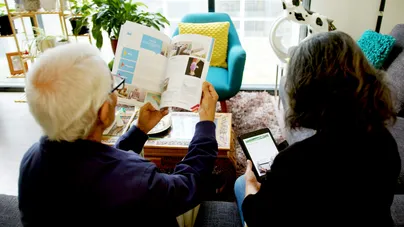In recent years, more people are redefining what retirement looks like. While some step away from traditional work altogether, many choose to continue working as they age. You may choose to keep working for financial security, social connection, or for the joy of meaningful and challenging activity.
Watch: Jilska and Mami discuss life after retiring

Hear Mami's and Jilska's stories.
Are you wondering how to keep busy in retirement? Jilska and Mami demonstrate two different ways to fill your days and find fulfilment after retiring.
Jilska celebrates her free time to study and do everything she never had time for before. Mami, on the other hand, found a new calling after retiring from the business that had been her career for 27 years.
Mami felt she might still have something to offer her community, so she became a community support worker. Now, she finds support work to be very fulfilling. She says of her clients, ‘They are so thankful every time I go… but I thank them, because I feel great!’
In fact, a sense of purpose is just one of the benefits of continuing to work after retirement.
Finding purpose after retirement
For a happy retirement, you need to feel a sense of purpose as well as safety. Funnily enough, a great way to support both is with the right kind of work. This isn’t to say you shouldn’t retire – but rather, you can choose the work hours and type of work that make you feel happy and fulfilled.
Fulfilling work can come from anywhere. It can be from paid or unpaid roles, formal or informal. It could be a volunteer job, regularly babysitting grandchildren, or studying courses in subjects that interest you. ‘Work’ doesn’t even have to be the word you use; it could be a ‘calling’. But whatever it is you choose to do with your life post-retirement, your mind and body will flourish if you keep them engaged with an enjoyable occupation.
The health benefits of working as you age
Whether full-time, part-time, or volunteer, work after retirement can support your overall health and wellbeing – socially, mentally, and physically.
Work can keep you socially active
Staying socially connected boosts mental health and can help you maintain a strong sense of community. Social connection has been found to be as important for your health across your lifespan as exercise.
Volunteering, in particular, is a wonderful way to socialise and foster meaningful connections. It’s associated with greater mental health and wellbeing, especially for older people.
A part-time job or volunteer role may introduce you to new friends. Mentoring or tutoring can allow to you share your skills and experience with younger generations. Whatever you choose, staying socially engaged can have lasting benefits for your health and happiness.
Work can keep you mentally active
Staying mentally active is beneficial for your brain health.
According to research from institutes such as the University of NSW’s Centre for Healthy Brain Ageing (CHeBA), how much you actively use your brain affects how well it will function later.
CHeBA also supports that work can be a complex mental activity, and a great way to keep your brain active as you age.
In fact, working longer into older age is associated with living longer and having lower risk of dementia.
Work can keep you physically active
If you have a job in an office, store, or any location that isn’t your home, you have an easy way to get some incidental exercise in your day. Having to physically go to work gives you an excuse to walk more, without having to consciously carve out some time in the day for exercise. And regular physical activity can help you stay mobile, fit, and strong.
If you have a remote job, however, you may need to remind yourself to get up and move your body now and then!
Flexible work options
Many workplaces offer part-time roles, casual work, or consulting opportunities. This can help you ease into retirement at your own pace.
If you’ve reached the preservation age, you may be able to access your super while working reduced hours. This can provide financial flexibility while you transition into retirement. You could balance work and leisure in a way that suits you, while financially preparing for retirement.
With the rise of remote work options, you could even continue working from the comfort of your own home.
Many employers may also offer flexible arrangements, such as job-sharing, short-term contracts, or seasonal work. Whether you prefer a fixed role or the freedom to take on occasional projects, there are plenty of options to choose from.
How to find meaningful work
It’s okay to test out different roles before you find the right position for you. There are many ways to explore new job opportunities:
- Check online job boards for part-time, casual, or remote roles. You can search the Jobs Hub for jobs that match your skills.
- Talk to local community organisations about volunteer positions.
- You can also search the LiveUp activities database for volunteer roles near you.
- Use your existing network! Friends and former colleagues may know of available roles that match your experience.
- You can also explore study options and short courses on the Course Seeker website, to expand your skillset.
Explore to find what works for you
Many people try out different roles before settling on something that feels right.
Whether it’s consulting, tutoring, mentoring, volunteering, or pursuing a creative passion, the key is to experiment and find what challenges you and makes you happy.
According to a 2012 study from Cambridge University, high social engagement and mentally challenging jobs are associated with lower risk of dementia. However, a 2021 study found that if a job is too stressful, low quality, or low reward, it’s not as likely to benefit your health.
There are many different approaches to working after retirement. What matters most is finding something that brings you satisfaction and purpose.
Here are a few more useful links:
- You can explore supports and services for mature-age workers here.
- Learn about the Age Discrimination Act and your right to fair treatment in the workplace here.
Get in touch with LiveUp
If you need more information, take the LiveUp quiz or get in touch with one of our helpful navigators on 1800 951 971.
References
Australian Government Department of Health. (2021). Physical activity and exercise guidelines for all Australians: For older Australians 65 years and over. https://www.health.gov.au/topics/physical-activity-and-exercise/physical-activity-and-exercise-guidelines-for-all-australians/for-older-australians-65-years-and-over
Australian Taxation Office. (2024). Transition to retirement. https://www.ato.gov.au/individuals-and-families/jobs-and-employment-types/working-as-an-employee/leaving-the-workforce/transition-to-retirement
Baxter, S., Blank, L., Cantrell, A. et al. (2021). Is working in later life good for your health? A systematic review of health outcomes resulting from extended working lives. BMC Public Health 21, 1356. https://doi.org/10.1186/s12889-021-11423-2
CHeBA. (2015). Complex mental activity. https://www.cheba.unsw.edu.au/resources-for-individuals
Harvard Health Publishing. (2017, September 1). Putting off retirement may benefit your brain, health, and longevity. Harvard Health Publishing. https://www.health.harvard.edu/staying-healthy/putting-off-retirement-may-benefit-your-brain-health-and-longevity
McDonough, I. M., Haber, S., Bischof, G. N., & Park, D. C. (2015). The Synapse Project: Engagement in mentally challenging activities enhances neural efficiency. Restorative neurology and neuroscience, 33(6), 865–882. https://doi.org/10.3233/RNN-150533
Rohwedder, S., & Willis, R. J. (2010). Mental retirement. Journal of Economic Perspectives, 24(1), 119–138. https://doi.org/10.1257/jep.24.1.119
Tabassum F, Mohan J, Smith P. (2016). Association of volunteering with mental well-being: a lifecourse of a national population-based longitudinal study in the UK. BMJ Open, 6(8), e011327. https://bmjopen.bmj.com/content/6/8/e011327
Valenzuela, M. J., & Sachdev, P. (2012). Active cognitive lifestyle is associated with positive cognitive health and a reduced risk of cognitive decline. PLOS One, 7(11), e50940. https://doi.org/10.1371/journal.pone.0050940
Wu, C., Odden, M. C., Fisher, G. G., & Stawski, R. S. (2016). Association of retirement age with mortality: A population-based longitudinal study among older adults in the USA. Journal of Epidemiology and Community Health, 70(9), 917–923. https://doi.org/10.1136/jech-2015-207097
Y.C. Yang, C. Boen, K. Gerken, T. Li, K. Schorpp, & K.M. (2016). Harris, Social relationships and physiological determinants of longevity across the human life span, Proc. Natl. Acad. Sci. U.S.A. 113(3) 578-583, https://doi.org/10.1073/pnas.1511085112
How to use this information
LiveUp provides free information to help you make informed decisions about your health. This information is for general and educational purposes only, is not intended to provide a comprehensive guide, and does not replace medical advice. Everyone is different, so some of these tips may work better for you than others. You should use your own judgment and seek medical advice when applying this information to yourself, to determine if it is suitable in your circumstances. Your use of, or reliance on, this information is solely at your own risk. Independent Living Assessment Incorporated is not responsible or liable for any injury, loss, or damage caused as a result of your use of, or reliance on, this information.
Download and print this article:
You can print out the PDF and stick it to your fridge or file away the tips to revisit at a later time.

Read more Social articles
Did you enjoy this article? You may also like reading similar healthy ageing articles.
See all Social articles

